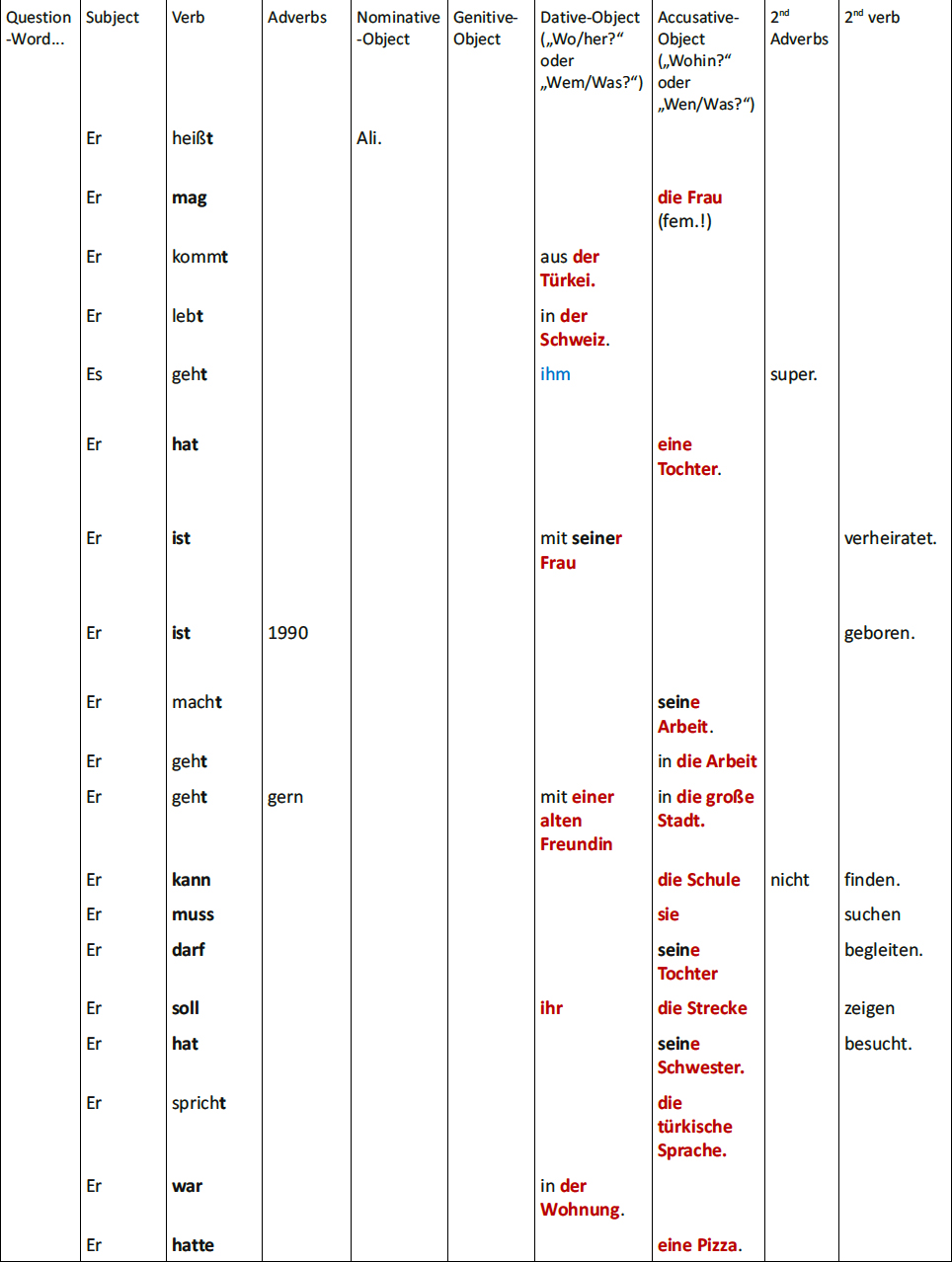Kapitel 4: “ER” - HE LIKES THE FEMININE FORMS 
Ali “likes the feminine gender”. This simply means that this chapter focusses on
- 1. the third person singular and the corresponding verb endings (which are highlighted),
- 2. mainly objects with nouns being feminine (highlighted in bold letters and color – remember: the feminine nouns are red!). So, if you look up all these nouns in the dictionary you will find out that all the nouns are “die”-Wörter, meaning that they are feminine and follow the feminine declination! I suggest to you to list all these nouns within a category “feminine nouns” in your exercise book,
- 3. also the related adjectives and articles are highlighted in red because they are somehow carrying this feminine form, if they are “connected” to the feminine noun.
Don´t mind, if you do not exactly UNDERSTAND this concept! I guess that even a lot of German natives and perhaps also teachers don´t! :) Nevertheless, if you are willing to study these sentences by heart, you are going to internalize and recognize important phrases and structures in a very natural way.
So, let us find out more about our third person masculine, about Ali:
“Er” (= the third person plural “He”):
Question-Word… |
Subject |
Verb |
Adverbs |
Nominative-Object |
Genitive-Object |
Dative-Object („Wo/her?“ oder „Wem/Was?“) |
Accusative-Object („Wohin?“ oder „Wen/Was?“) |
2nd Adverbs |
2nd verb |
|
Er |
heißt |
|
Ali. |
|
|
|
|
|
|
Er |
mag |
|
|
|
|
die Frau (fem.!) |
|
|
|
Er |
kommt |
|
|
aus der Türkei. |
|
|
|
|
|
Er |
lebt |
|
|
|
in der Schweiz. |
|
|
|
|
Es |
geht |
|
|
|
ihm |
|
super. |
|
|
Er |
hat |
|
|
|
|
eine Tochter. |
|
|
|
Er |
ist |
|
|
|
mit seiner Frau |
|
|
verheiratet. |
|
Er |
ist |
1990 |
|
|
|
|
|
geboren. |
|
Er |
macht |
|
|
|
|
seine Arbeit. |
|
|
|
Er |
geht |
|
|
|
|
in die Arbeit |
|
|
|
Er |
geht |
gern |
|
|
mit einer alten Freundin |
in die große Stadt. |
|
|
|
Er |
kann |
|
|
|
|
die Schule |
nicht |
finden. |
|
Er |
muss |
|
|
|
|
sie |
|
suchen |
|
Er |
darf |
|
|
|
|
seine Tochter |
|
begleiten. |
|
Er |
soll |
|
|
|
ihr |
die Strecke |
|
zeigen |
|
Er |
hat |
|
|
|
|
seine Schwester. |
|
besucht. |
|
Er |
spricht |
|
|
|
|
die türkische Sprache. |
|
|
|
Er |
war |
|
|
|
in der Wohnung. |
|
|
|
|
Er |
hatte |
|
|
|
|
eine Pizza. |
|
|
Translations of the sentences above:
His name is Ali.
He likes the woman (fem.!).
He comes from Turkey.
He lives in Switzerland.
He is feeling super!
He has a daughter.
He is married to his wife.
He is born 1990.
He does his work.
He goes to work.
He likes going to the big city with an old female friend.
He cannot find the school.
He must look for it.
He may accompany his daughter.
He shall show here the route.
He has visited his sister.
He speaks the Turkish language.
He was in the apartment.
He had a pizza.



 You are going to Learn:
You are going to Learn:  Common phrases,
Common phrases,  how to express facts with feminine nouns and pronouns,
how to express facts with feminine nouns and pronouns,  the third person singular,
the third person singular,  a lot of new vocabulary and
a lot of new vocabulary and  much more.
much more.